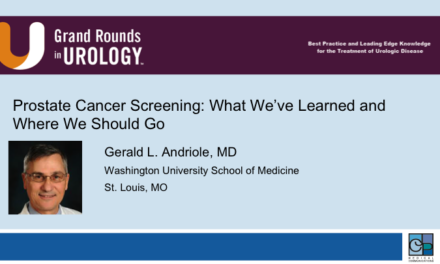Laurence Klotz, MD, FRCSC, presented “Active Surveillance or Focal Therapy as Primary Management” during the 25th Annual Southwest Prostate Cancer Symposium conference on December 9, 2021, in Scottsdale, Arizona.
How to cite: Klotz, Laurence. “Active Surveillance or Focal Therapy as Primary Management.” December 9, 2021. Accessed May 2025. https://grandroundsinurology.com/active-surveillance-or-focal-therapy-as-primary-management/
Active Surveillance or Focal Therapy as Primary Management – Summary
Laurence Klotz, MD, Professor of Surgery at the University of Toronto and the Sunnybrook Chair of Prostate Cancer Research, addresses when it is appropriate to use focal therapy versus active surveillance (AS) for prostate cancer. He observes that focal therapy for prostate cancer is controversial, with some doubting its efficacy entirely, and gives the disclaimer that he approaches the subject as an advocate for focal therapy in certain cases. Dr. Klotz then discusses the goals of AS, explaining that for de novo Gleason grade 1 patients, the purpose is to identify higher grade cancer, and for Gleason grade 2-3, the goal is identification of clinical progression while the disease is still curable. He notes that with AS, historically the risk of ‘progression’ to higher grade cancer has been 40%, while with focal therapy, the risk of failure is 35-40%, meaning that the risk of unrecognized/persistent GG ≥ 2 is similar for both. Dr. Klotz then considers the uses and appeal of focal therapy, emphasizing the benefits of a treatment that preserves the prostate and also allows time to intervene if the cancer returns. He also mentions some of the misuses and risks of focal therapy, arguing that it can be difficult to use in cases of tumor multifocality and heterogeneity and that the significant limitations of imaging and targeting, especially for Gleason grade 2 disease, can be challenging. Additionally, Dr. Klotz highlights the lack of level 1 evidence supporting focal therapy. He goes on to discuss what makes good candidates for partial gland ablation, describing patients with a Gleason grade 2 solitary unilateral lesion as being in the ‘sweet spot’ for focal therapy, while patients with more widespread or slightly higher grade disease may be candidates, but not necessarily. Dr. Klotz would not advise partial gland ablation to young patients with high-volume Gleason grade 1 unilateral disease who have a clear target on MRI, or to patients with Gleason grade 4 disease who have a small solitary lesion on biopsy and MRI. He then discusses the current management protocols for both AS and focal therapy in detail before concluding with a look at the future of focal therapy. Dr. Klotz argues that, despite the controversies, patients will increasingly demand focal therapy and therefore the urology field has a mandate to confirm its oncologic effectiveness and safety, and to determine which of the many methods of focal therapy is best.
About the 25th Annual Southwest Prostate Cancer Symposium:
Presented by Program Chairs Nelson N. Stone, MD, and Richard G. Stock, MD, this conference educated attendees about advances in the management of localized and advanced prostate cancer, with a focus on imaging, technology, and training in the related devices. It included a scientific session, as well as live demonstrations of surgical techniques. You can learn more about the conference here.
ABOUT THE AUTHOR
Laurence Klotz, MD, FRCSC, is a professor of surgery at the University of Toronto and the Sunnybrook Chair of Prostate Cancer Research. Dr. Klotz was the founding editor-in-chief of both the Canadian Journal of Urology and the Canadian Urology Association Journal (CUAJ), and he is now editor emeritus of the CUAJ. Dr. Klotz obtained his medical degree and completed his residency at the University of Toronto. He was also a uro-oncology fellow at Memorial Sloan Kettering Cancer Center in New York.
Dr. Klotz has 550 peer review publications and eight books. He coined the phrase “active surveillance” and successfully championed this approach for men with favorable-risk prostate cancer against substantial resistance. He was the associate editor of the Journal of Urology, responsible for prostate cancer, for eight years. Dr. Klotz received the Queen’s Jubilee Medal for outstanding public service, the University of Toronto's Lister Prize, the Society of Urologic Oncology’s SUO Medal, the American Urological Association’s Richard Williams Award, the University of Toronto's Lifetime Achievement Award, the Canadian Urological Association Lifetime Achievement Award, and the Harold Warwick Award from the Canadian Cancer Society for “outstanding contributions to cancer control.” In 2015 he was inducted as a Member of the Order of Canada, Canada’s highest civilian award.




